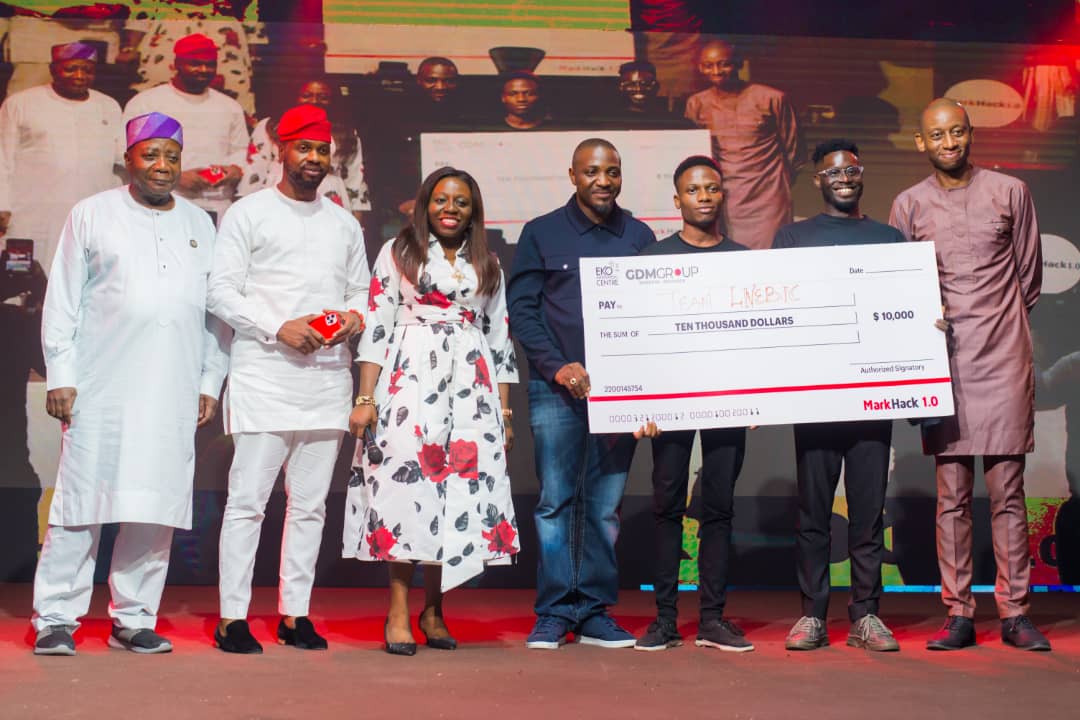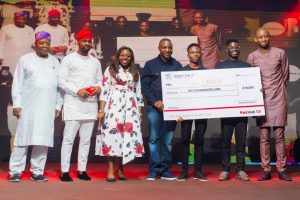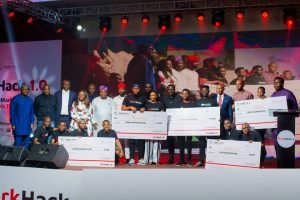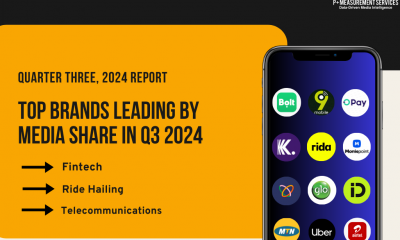Business
MarkHack 1.0: LiveBIc Clinches First Prize, as Eko Innovation Centre and GDM Group call for Technological Innovation to Disrupt Marketing Landscape

MarkHack 1.0: LiveBIc Clinches First Prize, as Eko Innovation Centre and GDM Group call for Technological Innovation to Disrupt Marketing Landscape
In what has proven to be game changing and a first-of-its-kind in the Nigerian media and marketing space, winning innovations have emerged at the grand finale of the maiden edition of Nigeria’s first marketing and media Hackathon tagged ‘MarkHack 1.0’ organized by the Eko Innovation Centre in collaboration with GDM Group.
LiveBIc, which comprised Shadrach Akao and Ernest Ogbanefe emerged the overall winners from a list of 10 finalists involved in the pitch at the finals of the hackathon. LiveBIc won the star prize of $10,000 for developing a new platform for content creators to market and deliver their content.
Sprayme clinched the second position and $4,000 prize money for innovating a new way for social gifting and content monetization; Reelbuzz emerged the third winner with $3,000 for creating an intuitive platform that helps brands connect and command higher brand loyalty; Innovatoras took the fourth position as well as $2,000 prize money for directing the leads for businesses and turning them to paying customers and Monify Cookies, fifth position with $1,000 for developing a browser tool that provides its users the ability to block all unsolicited ads and earn money from allowed ads.
The winners and runners-up will also get working space at Eko Innovation Centre, while all ten (10) finalists will have access to join the EIC accelerator program and GITEX Global pitch event in Dubai.
Recall, that the best 10 teams with the most viable concepts went head-to-head at the finale for the $20,000 prize pool and an acceleration programme with up to $50K equity investment to get their products ready for the market among other benefits.
Speaking on the initiative and what inspired it, Victor Afolabi, Founder, of Eko Innovation Centre, and Curator MarkHack 1.0 said, MarkHack 1.0 is a gathering of innovators, entrepreneurs, Policymakers, and Marketing Professionals, to create solutions to real-life Marketing challenges in an intense period of time. Using creativity, technology, and mentoring, resulting in prototypes, fresh new concepts, and innovative usages of tech for Marketing and Media.
He added that “Seeing how technology has disrupted global industries all over the world, we perceived that the marketing and media industry was ripe for disruption.
However, they are two things, it is either we collaborate with stakeholders in the industry to create the disruption we anticipate or we allow disruption to happen to us, and we choose to do the former.”
“The former involves working with over 100 organisations and representatives from the various organisations to co-create together and disrupt that which we anticipate. That co-creation gave birth to what we call MarkHack. We brought together experts in the industry across sectorial groups from clients, agencies, professionals, technology experts, venture capitalists, policymakers, regulators and we all came together to come to create the MarkHack,” he said.
On his part, Hakeem Popoola Fahm, Commissioner of Science and Technology, Lagos State applauded the organizers for the laudable initiative and stated that it is a testament to the success of Governor, Babajide Sanwo-Olu’s commitment to making Lagos a smart city by digitalizing its operations and providing an enabling environment for technology innovations to be given birth to.
He added that MarkHack 1.0 has shown that Marketers and media practitioners can digitalize operations and the state government would continue to support the ecosystem.
Similarly, the Special Adviser, Innovation and Technology to the Governor of Lagos State, Tubosun Alake said the government has been supporting various research works through Lagos State Science Research and Innovation Council (LASRIC) across multiple industries including the marketing industry and it won’t rest on its oars in actualizing the smart city agenda of the present administration.
Earlier in the programme, the President of the National Institute of Marketing of Nigeria (NIMN), Idorenyen Enang while delivering his keynote address at the event urged marketers to continue to innovate, and know how to use their channels effectively.
He had also emphasized that marketing is not merely about integrated marketing communication, adding that innovators require to follow laid-down principles of marketing.
Similarly, in a fireside chat, Franklin Ozekhome, CEO & Head of Growth, Identiture Africa; Seyi Tinubu, CEO/Chairman, Loatsad Promomedia; and Muyiwa Aleshinloye, Head of Marketing, Wakanow called on marketers to take advantage of technology to grow their brands as Metaverse, Artificial Intelligence, and others are being deployed to ease business operations.
The organizers of the event, Eko Innovation Centre and GDM Group revealed that over 500 individuals registered to participate in the hackathon from 72 locations, 5 countries (which includes Nigeria, California- USA, Kenya, Pakistan, and London), and 3 continents (Africa, Europe, and North America).
The participants were split into teams of 5 and were required to work together for 3 weeks, brainstorm, and come up with new concepts based on their areas of focus.
They were also sub-grouped into 8 focus areas which include consumer experience, media consumption, consumer recruitment & interaction, trade & retail engagement, analytics and metrics, events marketing, media monetization, and content creation.
Each team pitched their ideas to a respected Jury of experts in the subject matter, and the best 10 teams were picked by the Jurors before only five emerged winners at the grand finale. Overall, the hackathon had 21 Mentors, 30 Selection Jurors, 8 Speakers, and 8 Final Jurors who partook in the event and are the industry’s best with decades of experience in marketing, media, technology, and business management, and others.
The winners were judged by professionals which include Steve Babaeko, CEO/Chief Creative Officer, X3M Ideas & President, Association of Advertising Agencies of Nigeria; Iquo Ukoh, Director, Board of Directors, Letshego Microfinance Bank Ltd; Uwem Uwemakpan, Cofounder of Ingressive Capital; Tolulope Tomori Adedeji, Marketing Director, Anheuser-Busch InBev; and Debola Williams, Group CEO at Red Africa.
Others are Joseph Agunbiade, Cofounder, BudgIt; Kayode Oladapo, Assistant Regional Manager for Zone AOA (Africa, Oceania, and Asia), Nestle; and Jide Sipe, Head, Marketing and Corporate Communication, Ecobank Nigeria.
Business
Nigeria’s Inflation Drops to 15.10% as NBS Reports Deflationary Trend

Nigeria’s headline inflation rate declined to 15.10 per cent in January 2026, marking a significant drop from 27.61 per cent recorded in January 2025, according to the latest Consumer Price Index (CPI) report released by the National Bureau of Statistics.
The report also showed that month-on-month inflation recorded a deflationary trend of –2.88 per cent, representing a 3.42 percentage-point decrease compared to December 2025. Analysts say the development signals easing price pressures across key sectors of the economy.
Food inflation stood at 8.89 per cent year-on-year, down from 29.63 per cent in January 2025. On a month-on-month basis, food prices declined by 6.02 per cent, reflecting lower costs in several staple commodities.
The data suggests a sustained downward trajectory in inflation over the past 12 months, pointing to improving macroeconomic stability.
The administration of President Bola Ahmed Tinubu has consistently attributed recent economic adjustments to ongoing fiscal and monetary reforms aimed at stabilising prices, boosting agricultural output, and strengthening domestic supply chains.
Economic analysts note that while the latest figures indicate progress, sustaining the downward trend will depend on continued policy discipline, exchange rate stability, and improvements in food production and distribution.
The January report provides one of the clearest indications yet that inflationary pressures, which surged in early 2025, may be moderating.
Bank
Alpha Morgan to Host 19th Economic Review Webinar

Alpha Morgan to Host 19th Economic Review Webinar
In an economy shaped by constant shifts, the edge often belongs to those with the right information.
On Wednesday, February 25, 2026, Alpha Morgan Bank will host the 19th edition of its Economic Review Webinar, a high-level thought leadership session designed to equip businesses, investors, and individuals with timely financial and economic insight.
The session, which will hold live on Zoom at 10:00am WAT and will feature economist Bismarck Rewane, who will examine the key signals influencing Nigeria’s economic direction in 2026, including policy trends, market movements, and global developments shaping the local landscape.
With a consistent track record of delivering clarity in uncertain times, the Alpha Morgan Economic Review continues to provide practical context for decision-making in a dynamic environment.
Registration for the 19th Alpha Morgan Economic Review is free and can be completed via https://bit.ly/registeramerseries19
It is a bi-monthly platform that is open to the public and is held virtually.
Visit www.alphamorganbank to know more.
Business
GTBank Launches Quick Airtime Loan at 2.95%

GTBank Launches Quick Airtime Loan at 2.95%
Guaranty Trust Bank Ltd (GTBank), the flagship banking franchise of GTCO Plc, Africa’s leading financial services group, today announced the launch of Quick Airtime Loan, an innovative digital solution that gives customers instant access to airtime when they run out of call credit and have limited funds in their bank accounts, ensuring customers can stay connected when it matters most.
In today’s always-on world, running out of airtime is more than a minor inconvenience. It can mean missed opportunities, disrupted plans, and lost connections, often at the very moment when funds are tight, and options are limited. Quick Airtime Loan was created to solve this problem, offering customers instant access to airtime on credit, directly from their bank. With Quick Airtime Loan, eligible GTBank customers can access from ₦100 and up to ₦10,000 by dialing *737*90#. Available across all major mobile networks in Nigeria, the service will soon expand to include data loans, further strengthening its proposition as a reliable on-demand platform.
For years, the airtime credit market has been dominated by Telcos, where charges for this service are at 15%. GTBank is now changing the narrative by offering a customer-centric, bank-led digital alternative priced at 2.95%. Built on transparency, convenience and affordability, Quick Airtime Loan has the potential to broaden access to airtime, deliver meaningful cost savings for millions of Nigerians, and redefine how financial services show up in everyday life, not just in banking moments.
Commenting on the product launch, Miriam Olusanya, Managing Director of Guaranty Trust Bank Ltd, said: “Quick Airtime Loan reflects GTBank’s continued focus on delivering digital solutions that are relevant, accessible, and built around real customer needs. The solution underscores the power of a connected financial ecosystem, combining GTBank’s digital reach and lending expertise with the capabilities of HabariPay to deliver a smooth, end-to-end experience. By leveraging unique strengths across the Group, we are able to accelerate innovation, strengthen execution, and deliver a more integrated customer experience across all our service channels.”
Importantly, Quick Airtime Loan highlights GTCO’s evolution as a fully diversified financial services group. Leveraging HabariPay’s Squad, the solution reinforces the Group’s ecosystem proposition by bringing together banking, payment technology, and digital channels to deliver intuitive, one-stop experiences for customers.
With this new product launch, Guaranty Trust Bank is extending its legacy of pioneering digital-first solutions that have redefined customer access to financial services across the industry, building on the proven strength of its widely adopted QuickCredit offering and the convenience of the Bank’s iconic *737# USSD Banking platform.
About Guaranty Trust Bank
Guaranty Trust Bank (GTBank) is the flagship banking franchise of GTCO Plc, a leading financial services group with a strong presence across Africa and the United Kingdom. The Bank is widely recognized for its leadership in digital banking, customer experience, and innovative financial solutions that deliver value to individuals, businesses, and communities.
About HabariPay
HabariPay is the payments fintech subsidiary of GTCO Plc, focused on enabling fast, secure, and accessible digital payments for individuals and businesses. By integrating payments and digital technology, HabariPay supports innovative services that make everyday financial interactions simpler and more seamless.
Enquiries:
GTCO
Group Corporate Communication
[email protected]
+234-1-2715227
www.gtcoplc.com
-

 celebrity radar - gossips6 months ago
celebrity radar - gossips6 months agoWhy Babangida’s Hilltop Home Became Nigeria’s Political “Mecca”
-

 society6 months ago
society6 months agoPower is a Loan, Not a Possession: The Sacred Duty of Planting People
-

 society5 months ago
society5 months agoReligion: Africa’s Oldest Weapon of Enslavement and the Forgotten Truth
-

 news6 months ago
news6 months agoTHE APPOINTMENT OF WASIU AYINDE BY THE FEDERAL GOVERNMENT AS AN AMBASSADOR SOUNDS EMBARRASSING











